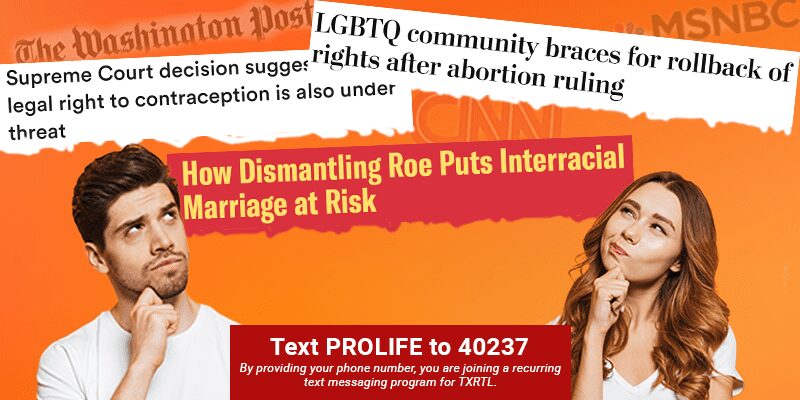The abortion industry, mainstream media, and leftist politicians have seized the end of Roe v. Wade as an opportunity to spread fear and hysteria amongst their supporters and the public. According to the left, the reversal of Roe endangers not only the supposed “right to abortion,” but even other rights, including interracial marriage, same sex marriage, and access to contraception.
The misinformation goes all the way to the top of the hierarchy. According to Biden, “a whole range of rights are in question.”
Yet, the fears being spread by the anti-Life forces are complete lies.
So where are all these lies coming from?
In 1973, the gruesome Roe v. Wade decision found abortion to be a constitutional right under the “right to privacy.” Even abortion advocates at the time recognized Roe was legally unsound as not only is abortion itself not explicitly mentioned in the U.S. Constitution but neither is the “right to privacy.”
The majority opinion in Roe based their ruling off cases such as Griswold v. Connecticut and Eisenstadt v. Baird that found the right to privacy to implicitly exist in the “Due Process Clause” of the 14th Amendment.
Anti-Lifers claim that the reversal of Roe threatens or even completely dissolves the “right to privacy” under which multiple constitutional rights have been established. Thus they reason that these other rights are in jeopardy.
Are these other rights in danger? To put it simply: No.
Examining Justice Samuel Alito’s majority opinion in Dobbs, the assertion that other basic rights established by the right to privacy are endangered is simply incorrect.
Though Justice Alito correctly acknowledges that the right to privacy is not explicitly stated in the Constitution, he does not argue that the right to privacy is nonexistent.
On the contrary, Alito uses two criteria from the 1997 Washington v. Glucksberg case to guarantee an unnamed right is implicitly found in the Constitution’s 14th Amendment. These criteria are that such a right must be “deeply rooted in this Nation’s history and tradition” and “implicit in the concept of ordered liberty.”
Using these two criteria, Glucksberg found that assisted suicide was not protected by the right to privacy. Using this same standard in Dobbs, the Supreme Court determined that abortion was not protected by the 14th Amendment. The reasoning? The Court states that the “right” to an abortion was entirely unheard of until the 20th century and is thus critically different than any other right protected by the 14th Amendment.
Alito goes so far as to clarify that other rights previously recognized by the Court, through the 14th Amendment’s implicit right to privacy, should not be called into question.
Alito is very intentional in distinguishing abortion from these other rights. Abortion, he states, “is fundamentally different … because it destroys what [Roe and Casey] called ‘fetal life’ and what [Mississippi’s law] describes as an ‘unborn human being.’” Alito specifically differentiates abortion from the rights the left continues to insist are under threat, including “intimate sexual relations, contraception, and marriage.”
Clearly, the fact that abortion involves a non-consenting party, a preborn child, means this issue is different from the other rights included under the right of privacy. This distinction is clear and keeps other rights from being jeopardized.
Anti-Lifers also argue that reversing Roe contradicts stare decisis, the standard of ruling in accordance with precedent. This, the left argues, will threaten many other rights the Court has previously ruled to be constitutionally protected.
Yet, this is not the only instance in which a case has been decided out of line with stare decisis. One obvious example of the Court breaking stare decisis is Brown v. Board of Education. In Brown v. Board the Court found that segregation in school, previously found constitutional in Plessy v. Ferguson, was actually unconstitutional.
The Court occasionally rejects stare decisis in cases where the previous ruling clearly misinterpreted the Constitution. This does not lead to the collapse of our rights. In reality, cautiously reexamining history to correct mistakes when necessary actually strengthens our rights. Brown v. Board strengthened the nation and so does Dobbs v. Jackson.
Making himself abundantly clear, and dashing the left’s fear mongering, Justice Alito explicitly states that his opinion “concerns the constitutional right to abortion and no other right,” and that “nothing in [the] opinion should be understood to cast doubt on precedents that do not concern abortion.”
The Court’s decision to reverse the horrific Roe decision gives states the ability to protect our nation’s vulnerable preborn children’s most sacred right—the Right to Life. Despite the left’s claims, it is evident from Alito’s opinion that Dobbs does not threaten other previously affirmed constitutional rights.


